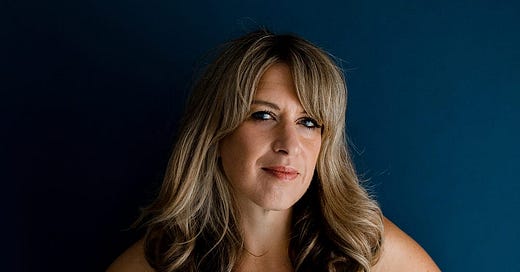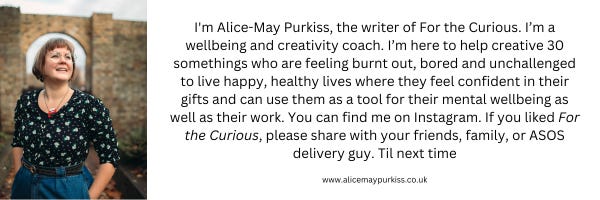For the Curious: Daisy Buchanan on Making Stories
"I’m extremely curious about the way other people are experiencing the world - and that feels like a creative gift I am deeply grateful for"
Daisy Buchanan is a best selling author, journalist, podcaster. She’s also really bloody lovely. I’ve been following Daisy for yeeeeeeears and she’s such a champion of the arts as ways to look after yourself. From her essay Burn Before Reading to her new book READ YOURSELF HAPPY she talks a lot about the power of words, whether our own or other people’s, to take care of ourselves. She also knows what it’s like to be on the end of a brain which gives you a hard time and I think this makes her all the more considerate of how we can use creative endeavours for mental maintenance.
Daisy is also the creator of the Creative Confidence Clinic. If you’re a person who likes to write, or thinks you might like to write, or actually, just likes reading about writing, it’s for you. It was recommended by Laura Price as one of her go-to sources of inspiration and reading Daisy’s writing about the challenges faced when we’re trying to be creative is like walking into a warm hug. She’s supportive and encouraging and funny and kind.
In our conversation below she says she can’t remember a time she wasn’t making up stories. I was much the same. I think many (most? all?) children are. It’s that playfulness that we lose somewhere along the way and with it our willingness to create, to try, to take a chance. I wonder how we can all reconnect with that part of ourselves who was eager to make mud pies and tell tall tales and imagine a nearby tree is haunted. Because it’s tapping into that freedom, I think, which is one of the most powerful parts of using creativity to look after ourselves.
First of all, what does creativity mean to you? What role does it play in your life?
It’s a funny word, isn’t it? I think I sometimes feel a little scared of it - I want more of it, or rather I worry that I’m not engaging with it enough. Everything that brings me joy and delight has emerged from someone else’s creative practise. And the more I read and watch and see and listen and dream, the more creative I feel.
Would you say you’re a creative person? If yes, why? If not, why not?
Yeahhhh - if I’m not a creative person I don’t know what else I could be! It definitely feels like a slightly fraudulent, ridiculous claim, I suppose because I wish I could feel a bit more bohemian and loose with my creative work, and love the process rather than fearing the deadlines!
You’re a writer - of both fiction and nonfiction. Why do you write? How does it make you feel? What drew you to writing?
I don’t remember a time when I wasn’t making up stories or being transported by other people’s stories - I think I have a strong streak of reality-denial, an urge to escape and visit other, brighter worlds. I love the way reading makes me feel, and I think I write to explore those feelings. However - I also write because I want to know how everyone else is thinking, feeling and living. I think a lot of writers - and readers - know what it is to feel strange. We worry that they are the only ones who have not been let in on the secrets of life. So I write - and read - because I want to know what’s going on in everyone else’s heads.
I also love the way you talk about reading. You wrote a gorgeous essay for The Pound Project called Burn Before Reading about reading and wellbeing after you experienced burnout. How does reading feed into your creativity, and in turn, your wellbeing?
Thank you so much! I’ve just finished my new book READ YOURSELF HAPPY which is out in February 2025 and there’s a chapter on this very thing - reading has, without a doubt, taught me everything I know about writing. I think that reading is an excellent cure for imposter syndrome - it’s inspiring and humbling. It has shown me there are no new ideas, and if you can let go of your fantasy of being unique, you can go on and make something unique. It has taught me that stories are in conversation with each other, when we write we are joining a community. It’s a great cure for perfectionism, and when we let go of ourselves - our egos, anxieties and need to excel - and understand that we’re just writing one of an infinite number of stories, we can serve the stories best.
Do you have any creative pursuits outside of what people might expect? What are they? How do they make you feel?
I don’t do it that regularly but every few months I’m seized with the urge to bake. I never do anything complicated but I find enormous comfort in the process and ritual and fairly reliable science of it. Follow the rules and something great will emerge. If my brain has to focus on someone else’s instructions, it’s robbed of the energy to wreak havoc independently.
And maybe sobriety! I stopped drinking alcohol two years ago. Whenever I do anything I used to do with wine, I have to think of a new way to approach it. The world feels new, loud, bright and raw. I can’t slide into old habits and patterns, I’m developing a kind of emotional agility which - I hope! - enhances my creative work.
I talk a lot about how creativity can help our wellbeing because we find ourselves in flow (that gorge sweet spot between work and joy). Can you describe what it feels like for you to be in flow and how creativity might have helped you get there?
Yesterday I was writing on the train - something I do rarely because I get fidgety and distracted - but when I had to get off the train and get on with things, I felt as though I’d woken up from a very vivid dream. I yearned to get back to the work, that feeling is delicious and rare.
I have to coach myself every single time I write to let the work be bad, to make peace with the fact that it’s always messy and it’s never elegant enough and you have to go up the hill before you can come down again. The first fifteen minutes is always awful but if you can endure that, you forget to notice the effort of what you’re doing and you just get on with it.
What does wellbeing mean to you? How do you pursue it in your life?
I take a LOT of vitamins. And then I have Vitamin B gummies that I don’t really need, but they’re a delicious reward for the chalky administrative hell of taking the first nineteen vitamins.
I suspect I’m a cliche - at 39, taking care of myself feels like a bit of a novelty and a relatively recent development. As I get older I think I get much better at doing what I can to maintain equilibrium, rather than waiting until there’s a crisis. Also, I suspect that I’ve turned ‘wellbeing’ into a bit of a hobby, like Uncle Davey in The Pursuit Of Love. It’s the ever shifting issue of knowing when to do hard things, why to do hard things, when to stop doing hard things. Making sense of our seasons. But for now it’s kefir and home made ginger shots and Morning Pages and running and being in the sea as often as I can. Pound shop Goop vibes.
Have you faced any challenges around creativity? How did you overcome them?
When I was writing my third novel Limelight, I had a crisis and a breakdown, and I froze. I felt so scared and overwhelmed. There seemed to be an insurmountable gap between the writer I was and the writer I wanted to become. I went into some dark tunnels and became obsessed with all of the wrong things. I told myself, over and over again, that I was a failure and that I wasn’t likeable or talented enough to have the career I longed for. Also I kept trying to rush the writing because my deadlines made me feel so afraid. It took a long time to tell that story as it deserved to be told. It changed so much from draft to draft that I feel almost as if I wrote three different books.
So I quit drinking - I knew that the dark thoughts became completely opaque when they were part of a hangover. I tried, very hard to get over myself and accept it was just a book! No-one was dying! I reminded myself that I was - am - doing my dream job. And I had to reckon with myself and accept that always trying to be the best was a) impossible and b) not that interesting. When I wrote my fourth novel Pity Party, all I really cared about was making myself laugh. That made life much easier.
How do you stay inspired and motivated to continue exploring your creativity?
I think it’s as simple as having an idea, not knowing what happens and wanting to find out. I’m currently training for the London Marathon - I’ve never done it before, I’m not a runner, I didn’t do any running at all until I was 30. And I’m so, so curious about what my body is capable of, and the seemingly impossible things that might happen if I just keep trying. I think that’s it - we have no idea what might happen, but it might be something great, and we’ll only stumble upon it if we keep going. And if I need reminding that there are no bad ideas - or that bad ideas can be the best ideas - I watch Shooting Stars.
What do you think the impact of having a creative career/mind/life has on you?
I hope I’m empathetic, I hope I see the best in people and I think I’m extremely curious about the way other people are experiencing the world - and that feels like a creative gift I am deeply grateful for. I’m pretty good at entertaining myself - I believe that reading fiction is a creative act, and if you love novels you are never, ever bored. In fact, maybe that’s the biggest and best impact. I’m never bored!
Creative Calm
Are you feeling anxious, burnt out and overwhelmed? Are you looking to take care of yourself in ways that feel meaningful and using tools which feel like things you want to do? Creative Calm is for you.
A balm for an anxious and busy mind, it’s an eight session programme of 1:1 coaching sessions exploring how a regular creative practice can help you manage anxiety, solve problems, think differently and take control of your wellbeing. Unlock your creativity and reclaim your wellbeing through a series of sessions rooted in transformational coaching, psychology and research.
If you’re feeling anxious, overwhelmed, stagnant and you can’t remember the last time you tried something new, this programme is for you.





